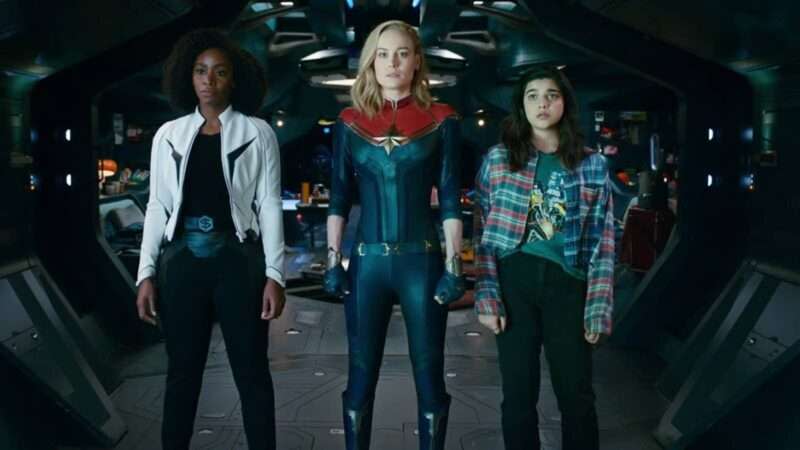The Marvels Is the Tedious Culmination of a Lot of Superhero Homework

- Oops!Something went wrong.Please try again later.
In a recent report about the declining state of the Marvel Cinematic Universe, Variety published what might be the single funniest sentence I have ever read in a trade report about the movie business.
Discussing the long-delayed reboot of Blade, a comic-book movie franchise about a good half-vampire who elaborately kills bad full-vampires with a sword, the article reported that "the story at one point morphed into a narrative led by women and filled with life lessons." In this script, Blade—nominally the central character of the movie bearing his name, a character previously announced to be played by the Oscar-winning actor Mahershala Ali—"was relegated to the fourth lead."
How, one wonders, does something like that…happen?
The screenwriter behind that concept will presumably go on to offer a script for the next Batman movie: A group of depressed housewives band together to learn life lessons while some guy dressed as a bat also punches criminals on the mean streets of Gotham.
Or perhaps the screenwriter was merely confused, somehow working under the premise that they were working on the next installment in the Captain Marvel series. Because the latest film in the Marvel Cinematic Universe, The Marvels, comes depressingly close to fitting the unmade Blade reboot's description. Let's just say it's far from marvelous.
This sequel to 2019's Captain Marvel follows a trio of superpowered female characters: Captain Marvel/Carol Danvers (Brie Larson), the cosmically powered title character from the previous film; Ms. Marvel/Kamala Khan (Iman Vellani), a teen superhero from New Jersey with the ability to convert light energy into solids; and Monica Rambeau (Teyonah Parris), an astronaut affiliated with a secret military organization exploring extraterrestrial intelligence.
What brings this trio together is a marketing stunt disguised as a mystical plot device: a glowy, computer-animated space-time anomaly appears and then blah blah blah, purple monkey dishwasher. In any case, the three characters start switching places via some sort of quantum nonsense, at first randomly and then with more purpose, allowing them to work together, tag-teaming in and out of fights like professional wrestlers.
The gag is meant to create a literal, physical connection between the women, to help them understand they are powerful as individuals but even more powerful together. But given how flatly the movie characterizes its core trio, this gimmick only adds to the sense that, aside from their powers, its heroes are mostly interchangeable.
In the meantime, there is brewing angst amongst the Kree, the alien antagonists of the previous movie. They're angry because their planet is dying, and their new leader, the villainous Dar-Benn (Zawe Ashton), has a plan to save them. That plan involves retrieving a pair-bonded Quantum Band from Khan and glowering while delivering a lot of Wikipedia-level exposition in a forgettably menacing monotone. Actually, I take that back: Wikipedia does a far better job of explaining this movie's underpowered, barely comprehensible story than the movie does itself.
There are a handful of somewhat inventive action scenes involving the randomly place-switching core trio, and director Nia DaCosta seems more genuinely interested in crafting crisp, clever action beats than many previous Marvel movie directors. But the movie, the 33rd in the Marvel Cinematic Universe, buckles under the accumulated weight of franchise lore. To fully understand—I am reluctant to say appreciate—every single thing that happens, you need to have seen not just the first Captain Marvel but the Disney+ superhero miniseries Hawkeye, Ms. Marvel, and Secret Invasion. In the director's own words, The Marvels is "a sequel to five different things." This isn't a movie so much as the tedious culmination of a lot of superhero homework.
Marvel's streaming TV series were supposed to keep the superhero franchise fires fueled between the big event films that have dominated the box office for the last decade or so. In practice, however, the streaming tie-ins have made the theatrical releases feel less like major events. At just over 100 minutes, The Marvels plays like a double-length Very Special Episode of a streaming series. It's a narrative (barely) led by women who, I suppose, learn life lessons. Why oh why couldn't there have been a guy killing vampires with a sword?
The post <i>The Marvels</i> Is the Tedious Culmination of a Lot of Superhero Homework appeared first on Reason.com.

